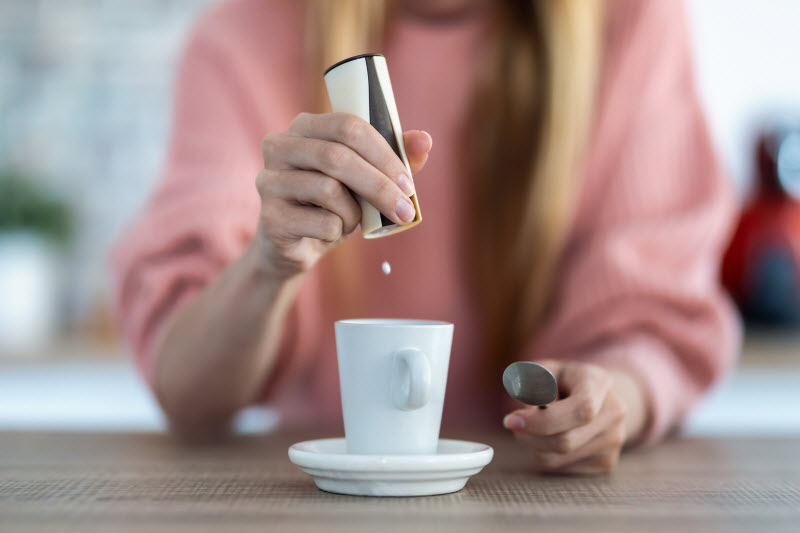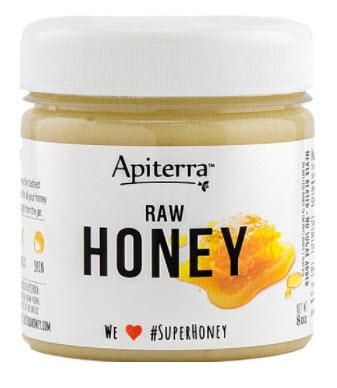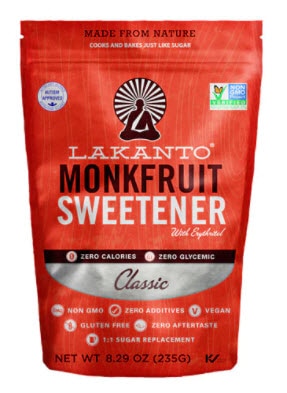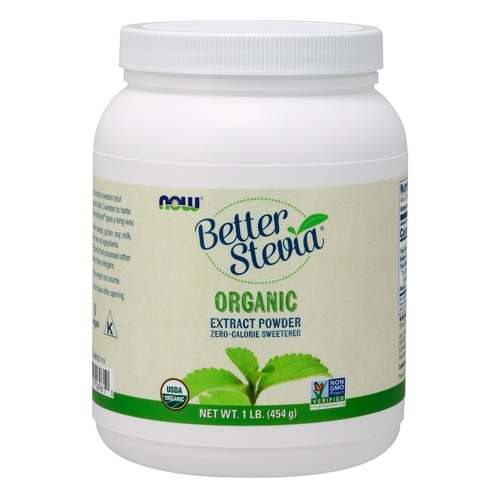A new study raises questions about whether
artificial sweeteners can sour your gut health.
The
study, published in September 2021 in the International Journal of Molecular Sciences, suggests that consuming artificial sweeteners could potentially cause digestive discomfort and even disease.
According to Statista, more than 141 million Americans used sugar substitutes such as artificial sweeteners in 2020.
The study adds another wrinkle to the ongoing debate over whether artificial sweeteners are good or bad.

Artificial sweeteners and gut health
In the study, researchers at Israel’s Ben-Gurion University tested six artificial sweeteners approved by the U.S. Food and Drug Administration (FDA) and found they interfere with communication among beneficial gut bacteria. Although none of the sweeteners killed bacteria, three of the six significantly hampered bacterial communication, causing an imbalance in gut bacteria and possibly contributing to digestive issues.
Lead researcher Karina Golberg says in a
news release that the study’s findings indicate artificial sweeteners “may be problematic in the long run.”
In reporting on the study, The Times of Israel
noted that “gut bacteria keep people healthy, but to do so they need to be present in the right balance. This is maintained in part by a communication mechanism that bacteria use, called quorum sensing, which enables bacteria to detect and respond to cell population density by regulating their own genes, affecting their behavior.”
Aside from prompting digestive problems, out-of-kilter gut bacteria can increase the risk of obesity, type 2
diabetes and other health issues.
For the study, researchers tested sports supplements for the presence of six artificial sweeteners: aspartame, saccharin, sucralose, acesulfame potassium, advantame and neotame. The researchers discovered that three common artificial sweeteners — aspartame (Equal), saccharin (Sweet’N Low) and sucralose (Splenda) — seriously disrupted bacterial communication. At least one of the three artificial sweeteners was found in all of the sports supplements that were tested.
“There is little accurate labeling of artificial sweeteners on products, which makes it difficult to know how much each product contains. Our research should push the food industry to re-evaluate their use of artificial sweeteners,” says the study’s other lead researcher, Ariel Kushmaro.
‘Attractive alternatives’ to sugar?
The Israeli study isn’t the only one to connect the dots between artificial sweeteners and gut health. Utah State University Extension
cites one study that indicated consuming artificial sweeteners can change the bacteria living in the intestine, and another study that suggested artificial sweeteners can prompt glucose intolerance by altering gut bacteria.
Nonetheless, artificial sweeteners — found in soft drinks, baked goods, candy and other products — “can be attractive alternatives to sugar because they add virtually no calories to your diet. Also, you need only a fraction of artificial sweetener compared with the amount of sugar you would normally use for sweetness,”
according to the Mayo Clinic.
Therefore, the Mayo Clinic says, artificial sweeteners can play a role in weight reduction and diabetes control. In addition, artificial sweeteners don’t contribute to cavities or other dental issues.
But an
article published in 2011 in the Journal of Pharmacology & Pharmacotherapeutics argued that while artificial sweeteners can replace sugar — which can be harmful in its own right — animal studies have “convincingly proven” that artificial sweeteners cause weight gain, brain tumors, bladder cancer and a slew of other health hazards.
However, as the Mayo Clinic observes, “there’s no sound scientific evidence that any of the artificial sweeteners approved for use in the United States cause cancer or other serious health problems. Numerous studies confirm that artificial sweeteners are generally safe in limited quantities, even for pregnant women.”
Harvard Health Publishing
emphasizes that the American Heart Association and American Diabetes Association have given a “cautious nod” to substituting artificial sweeteners for sugar to combat obesity, metabolic disorders and diabetes. But the Food Institute
cautions that artificial sweeteners might actually aggravate obesity,
metabolic disorders and diabetes.
Experts: Use artificial sweeteners in moderation
If you do choose to include artificial sweeteners in your diet, health experts recommend going easy on them.
“While all artificial sweeteners on the market are generally considered safe, it is still important to use them in moderation. It is a healthy practice to limit intake of processed and convenience foods that contain sweeteners and other additives, while eating more whole foods with little to no processing,”
according to Wisconsin’s Gundersen Health System.
And if you’d like to rid your diet of artificial sweeteners (and pure sugar), you might try natural sweeteners like fruit juice,
honey,
molasses,
maple syrup or
agave as substitutes. However, even these natural sweeteners might be refined and processed, making them less healthy alternatives. On top of that, natural sweeteners still count as added sugars.
What about stevia and monk fruit extract?
Both are
stevia and
monk fruit extract are FDA-approved sugar substitutes.
Stevia (sold under brand names like Truvia, Pure Via and Stevia In The Raw) is a natural substitute for sugar that’s extracted from leaves of stevia plants. It’s a processed and refined product that contains no calories and is much sweeter than sugar.
The Mayo Clinic
says there’s no evidence that stevia provides any advantage over other sugar alternatives when it comes to weight loss. Plus, stevia may cause side effects like nausea and a feeling of fullness.
“With little long-term outcomes data available on the plant extract, it is possible that stevia in large quantities could have harmful effects,”
according to the American Council on Exercise. “However, it seems safe to say that when consumed in reasonable amounts, stevia may be an exceptional natural plant-based sugar substitute.”
Monk fruit extract, also a natural substitute for sugar, is made from crushed monk fruit. Like stevia, it contains no calories and is much sweeter than sugar. Some monk fruit extracts are combined with sugar or molasses, stripping away monk front’s calorie-free status. In addition, some monk fruit sweeteners might contain a sugar alcohol called erythritol, which can trigger digestive problems.
So far, the health benefits of monk fruit sweeteners aren’t concrete. The Cleveland Clinic
notes that these sweeteners might contain beneficial
antioxidants and might contribute weight loss. But these and other sugar alternatives actually might boost your dependence on sweet foods and beverages.
Featured Products








